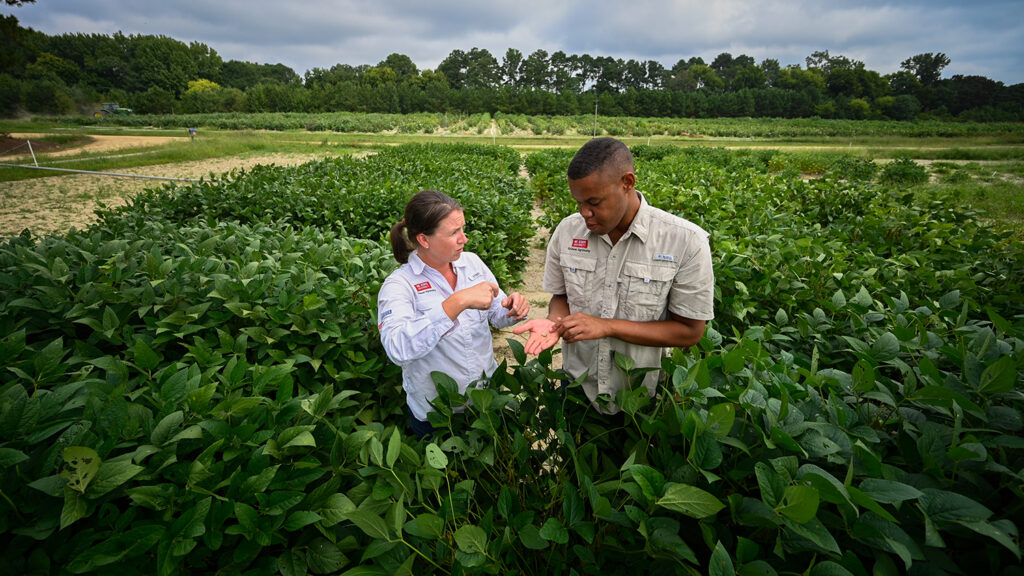A $1 million grant from the National Science Foundation is beginning efforts to build an agricultural technology corridor from central to eastern North Carolina.
The project brings together researchers from six North Carolina universities and county representatives and experts from NC Cooperative Extension, including representatives from the NC Biotechnology Center, RTI International, and the NC Community College System.
North Carolina State University is one of the partners in the NSF-funded Regional Innovation Engine project led by NC A&T State University. Other partner universities include East Carolina University, Duke and Wake Forest University, and the University of North Carolina at Chapel Hill.
The project, called Climate-Responsive Opportunities in Plant Sciences (CROPS), will expand efforts to share research-based and new technologies, particularly those that can lower barriers to market entry and help resource-limited farmers succeed. The purpose is that. Developing with entrepreneurship in the face of climate change.
This spring, partners will work together to develop a plan for the development of a 42-county agricultural technology innovation corridor that will allow agricultural improvements to reach underserved areas of the state faster. Start cooperation.

NC PSI leads North Carolina’s contribution
The North Carolina Plant Science Initiative will lead North Carolina State University's contribution to the project. The university's principal investigator on the project is Ross Sozzani, professor of plant and microbial biology and leader of the NC PSI plant improvement platform. The university's proposal development department also plays an important role.
Other North Carolina State University faculty members co-leading various aspects of the project or serving on governance committees include:
- Adrian Percy, North Carolina PSI Director
- Rachel Vann, Crop and Soil Science Extension Specialist and Assistant Professor, NC PSI Extension, Outreach and Engagement Platform Director
- Anders Huseth, extension specialist and associate professor of entomology and plant pathology
- Terry Long, Professor of Plant and Microbial Biology and Director of North Carolina PSI Education and Workforce Development Platform
- Kranos Williams, Professor of Electrical and Computer Engineering, Plant and Microbial Biology, and Director of the NC PSI Data-Driven Plant Science Platform
- Chris Reberg-Horton, Professor of Crop and Soil Science and Director of the NC PSI Resilient Agricultural Systems Platform
Aligning research with farmer-led priorities
As Sozzani says, CROPS specifically aligns its research pipeline with farmer-led priorities to develop new and innovative solutions to empower small and medium-sized farmers and increase their overall profitability. It is one of the first state initiatives to develop. The project includes a combination of educational programs, workforce development activities, and startup grants.
CROPS also suggests ways to help small-scale producers identify profitable new crop and livestock enterprises and develop community-based regional food systems. It will also highlight climate-smart technologies and ways to create climate resilience, while providing information on technologies that help agricultural businesses thrive.
Outreach and talent development are key
The program also includes a strong workforce development component. Terry Long of North Carolina State University said: “Even though agriculture in agribusiness is the biggest driver of North Carolina’s economy, many people, especially young people, are unaware of the growing depth and breadth of job opportunities available in these fields. not.” .
“The CROPS initiative aims to bridge the gap between employers and job seekers by expanding existing avenues and providing new paths to these career opportunities.”
Outreach will also be at the heart of the project, with the CROPS Extension Agent Network amplifying the project's impact.
The network is modeled after NC PSI's Extension Agent Network, which Vann leads. The network has engaged with end users in a way that has accelerated technology development, Sozzani said.
“By seamlessly integrating this framework into the ground-breaking CROPS initiative, extension agents will drive technology development and adoption that will ultimately have a far-reaching impact on the economies of agricultural regions.” Sozzani says Mr.
“These enhancement agents help bridge the gap between researchers and the end users of their research,” she added. “This joint effort will empower farmers, foster relationships, and drive innovation at the grassroots level by leveraging the state’s robust extension system to lead the agricultural sector toward a sustainable and resilient future.” I promise to do it.”
The program will begin this spring with listening sessions across the state, and the program will be free to participants.


